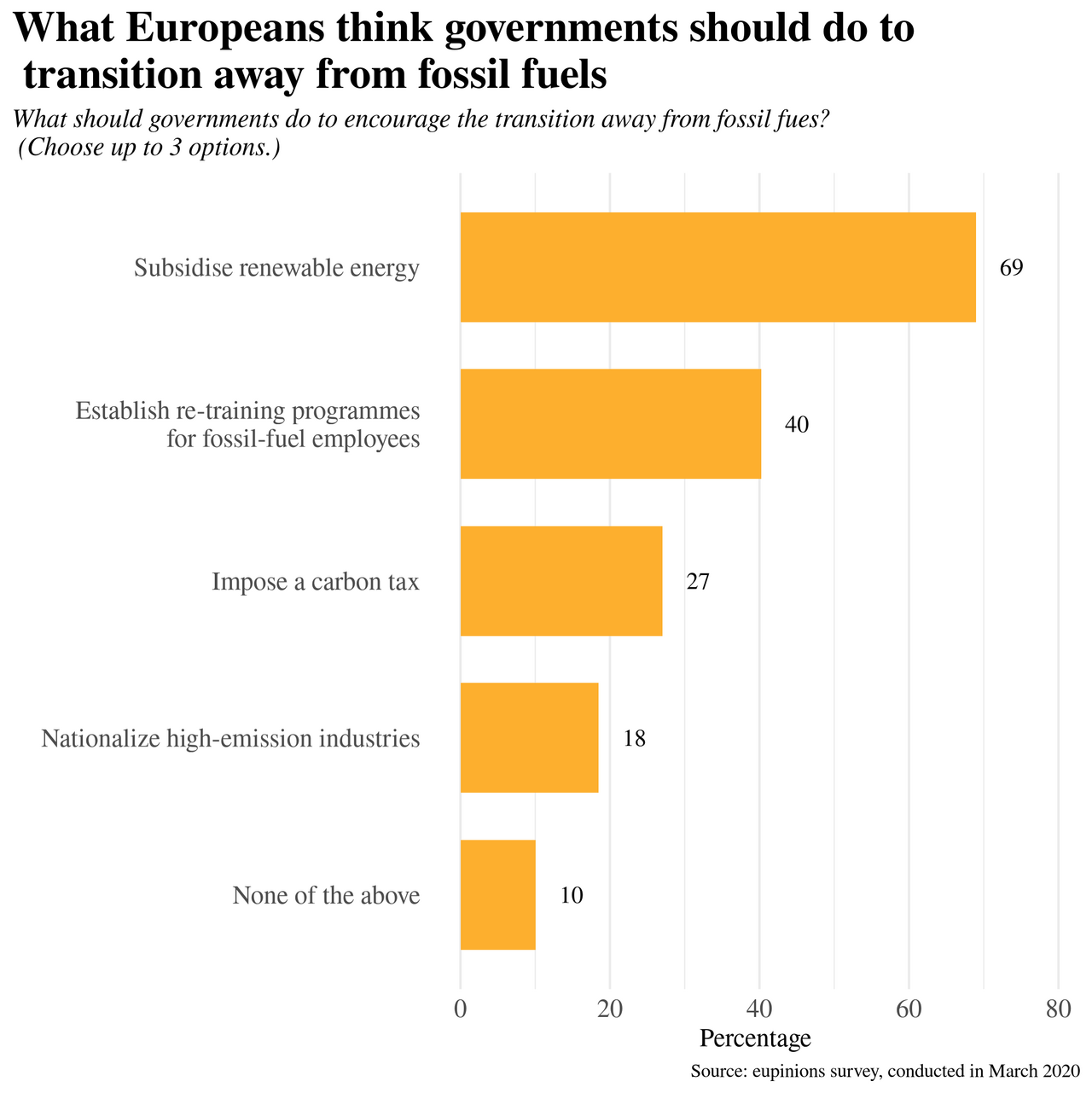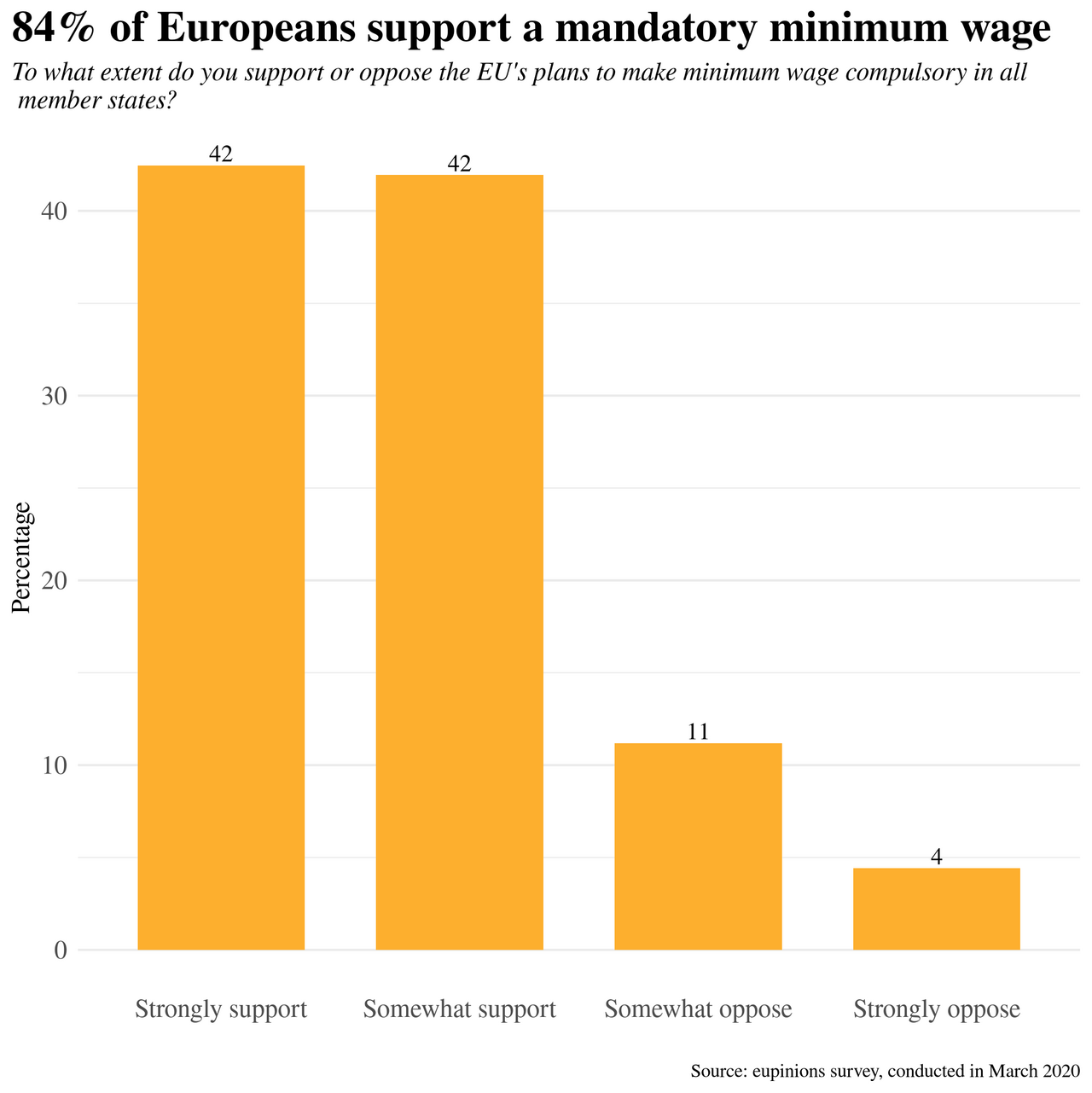Europe finds itself in an unprecedented crisis which is pushing many of its citizens into existential uncertainty. Our EU-wide poll, conducted in March 2020, as the corona virus was spreading across the continent, shows Europeans embracing some radical positions.
Remarkably, 71% of Europeans support the introduction of a universal basic income (UBI). Equally remarkably, but in another direction, 53% of young Europeans place more confidence in authoritarian states than democracies when it comes to addressing the climate crisis. Our questions were formulated before the virus struck, but it would be interesting to explore whether a similar sentiment is found around states' ability to combat pandemics.
The questions in this survey were designed by the research team of Europe's Stories, a research project of the Dahrendorf Programme for the Study of Freedom at the European Studies Centre, St Antony's College, University of Oxford, in consultation with the experts of the Bertelsmann Stiftung's eupinions survey. The poll was then conducted between March 5th and March 25th 2020 as part of the quarterly eupinions wave, using their usual methodology. More than 12,000 respondents between the ages of 16 and 69 were surveyed in all 27 EU member states and the United Kingdom, which very recently became an ex-member state. For short, we call them 'Europeans', although we are well aware that our results do not include all European countries. To say 'EU citizens' would no longer be accurate, since the UK has left the EU. We broke the data down into three age cohorts, 'young' (aged 16-29), 'middle' (30-49) and (as seen by our young researchers) 'old' (50-69). The full questionnaire used in the survey can be found found here.
The eupinions Great Expectations survey, authored by Catherine de Vries and Isabell Hoffmann in November 2019, found that Europeans think climate change, jobs and social security should be among the EU’s top priorities for the future. We wanted to explore in more depth what kind of policies Europeans wish for in these areas. How do European citizens, especially the young, perceive their future? What do they want done? Who do they want to do it?
The first set of five questions was on climate change. Which regime type do citizens trust most to address the climate emergency in the future? The most remarkable finding is that 53% of young Europeans place more confidence in authoritarian states than democracies to handle the climate crisis. In contrast, only 42% of those aged 30 – 49 strongly (9%) or somewhat (33%) think so. Only 35% of older Europeans strongly (5%) or somewhat (30%) place greater trust in authoritarian regimes. This underlines and reinforces a trend already detected by the political scientists Roberto Stefan Foa and Yascha Mounk, drawing on earlier findings from the World Values Survey.

Figure 1
Generally speaking, most Europeans believe climate change requires imminent action. Carbon emissions from cars, planes and industry are an important driver of climate change. Europeans see greater urgency to reduce these emissions than the European Commission currently does. On average, 58% of Europeans would like EU countries to reduce their carbon emissions to no excess emissions by 2030. The current Commission target of EU carbon neutrality by 2050 received the support of only 8% of the young and 10% of those aged 30 – 49 and 50 – 69. No common European target should be set according to 11% of those aged 16 – 29, 13% of those aged 30 – 49 and 13% of those aged 50 – 69.

Figure 2
We asked who should bear the primary responsibility for addressing the climate crisis and let survey respondents choose up to three of the following options: individuals, businesses, local governments (e.g. mayors, town councils, regional bodies), national governments, the EU, international institutions such as the UN or none of these options. According to our evidence, Europeans across age groups think national governments are primarily responsible for addressing the climate crisis (48%), followed by the EU (39%), businesses (36%) and individuals (33%). Older Europeans have a heavier reliance on national governments. 53% of the old think national governments should bear the primary responsibility for handling the climate crisis, while 42% of the young do. To young Europeans, intergovernmental institutions are more important: 63% think either the EU (40%) or international institutions (23%) are responsible for addressing the climate crisis. Amongst older Europeans, only 52% selected the EU (37%) or international institutions (18%). In post-Brexit Britain, 62% think national governments should bear most responsibility, but one third of those asked also name the EU.

Figure 3
*Multiple choices possible
How should these governments go about tackling climate change? Not at the cost of people's freedoms or way of life! Europeans seem reluctant to let their states restrict anything they enjoy. We asked survey respondents to pick what restrictions they would be most willing to support to address global warming: a ban on non-essential flying, a ban of all petrol and diesel vehicles, or a ban on meat-consumption. 34% do not support any of these restrictions on their individual freedoms. 35% of Europeans are most willing to support a ban on non-essential flying and 25% a ban on all petrol and diesel vehicles. Only 6% are most willing to accept restrictions on their eating habits. These trends vary slightly across age groups. We suspect age cohorts might be most resistant to banning what they cherish most. For example, 40% of older Europeans would give up flying, whereas only 31% of younger Europeans would. In turn, 30% of young Europeans could do without petrol and diesel vehicles, while only 21% of those aged 50 – 69 would give up their vehicles.

Figure 4
To encourage the transition away from fossil fuels, 69% of Europeans think governments should concentrate on subsidising renewable energy. We provided respondents with the following ways to move away from fossil fuels and let them choose up to three: establish re-training programmes for employees of fossil-fuel businesses to move to other industries, subsidise renewable energy, impose a carbon tax, nationalize high-emission industries or none of these options. Besides subsidising renewables, Europeans also think governments should establish re-training programs for employees of fossil-fuel businesses to move to other industries (40%), followed by imposing a carbon tax (27%). Older Europeans express strongest support for subsidising renewable energy (72%).

Figure 5
*Multiple choices possible
The second part of our survey was devoted to a deeper dive into attitudes on jobs and social security, also attempting to tease out generational differences. As already noted, the most striking finding was that 71% of Europeans support the introduction of a universal basic income (UBI). For an idea that has often been dismissed as wildly unrealistic and utopian, this is a remarkable figure. This support is equally strong across age groups: 71% of Europeans aged 16 – 29 strongly or somewhat support the introduction of a basic income, while 71% of those aged 30 – 49 and 70% of those aged 50 – 69 do.

Figure 6
A remarkable 84% of Europeans support an EU proposal for a mandatory minimum wage. In her opening statement at the European Parliament in July 2019, the newly elected EU Commission President Ursula von der Leyen announced she would create a framework making minimum wages compulsory across member states. Amongst those aged 16 – 29, 84% strongly or somewhat support the EU's plans. Numbers are identical for those aged 30 – 49 and support is even stronger amongst older Europeans: 86% of those aged 50 – 69 strongly or somewhat support the introduction of a minimum wage. The idea of a minimum wage is especially popular in Germany where 87% are in favour of the Commission’s plans.

Figure 7
We wanted to know how Europeans perceive their personal economic prospects. Across age groups, Europeans split neatly into optimists and pessimists – 50% are either very or somewhat confident about their job allowing them an adequate standard of living in 10 years’ time and the other 50% are not very confident or not at all confident about their future standard of living. Surprisingly, despite the Covid-19 outbreak and widespread concerns about the 'gig economy' and the impact of technological change, the young are more optimistic about their future job security than the old. 66% of the young are very or somewhat confident about their future job security, while 53% of Europeans aged 30 – 49 and only 35% of the old share the same kind of optimism.

Figure 8
We did, however, find that Europeans are slightly less confident about the next generation’s job security than about their own: only 43% of Europeans are rather confident about the next generation’s job security. Despite this trend, the young are, once again, slightly more optimistic. 51% of them are either very or somewhat confident about the next generation’s future prospects, whereas only 38% of the old are. Strikingly, British respondents are above the EU average for confidence about job prospects, in spite of Brexit. Or is it: because of Brexit? Unsurprisingly, south Europeans are significantly more pessimistic about both their own and the next generation's job prospects.

Figure 9
Finally, we wanted to find out what Europeans think is endangering their jobs. We asked survey respondents what they regard as the main threat to jobs in their country, allowing them to choose up to three of these options: new technologies including Artificial Intelligence, measures to reduce carbon emissions, effects of climate change (e.g. flooding, drought, natural disasters), inequality, inadequate life-long education, immigration, highly-qualified people leaving their country, increased competition through globalization, economic downturn, low economic growth, financial crisis, other/none of these options. According to our results, Europeans think the state of the economy poses the most severe threat to jobs in their country: a financial crisis (31%), low economic growth (29%) and economic downturn (28%) are considered the biggest threats to jobs; followed by inequality (24%), immigration (24%), new technologies (22%), brain drain (20%) and the effects of climate change (20%). To the young generation, inequality (28%) is the biggest concern after a financial crisis (35%), whereas for the old generation, immigration (26%) follows after concerns about an economic downturn (33%), low economic growth (32%) and a financial crisis (27%).

Figure 10
*Multiple choices possible
These results obviously need to be read against the backdrop of the Covid-19 pandemic bringing outside life almost to a halt in the month of March 2020. By the end of the month, most EU member states and the UK were under some form of lockdown to slow the spread of the coronavirus. So plainly the survey was conducted at a time of heightened economic and social insecurity.
Full results of the survey can be found on the europeanmoments.com website of the Oxford University Europe's Stories project, together with interesting findings from other European opinion polls. There too you can find more than 100 interviews with Europeans, who tell us about their formative, best and worst European movements, and what they would like Europe to do by 2030. The most frequently mentioned formative moment is the fall of the Berlin Wall, the currently leading worst moment is Brexit.
It is clearly too soon to say what kind of moment the Corona virus pandemic will turn out to be for Europe, but it will surely be an important one. Since we cannot continue our programme of face-to-face interviewing during the lockdown, we have created an easy-to-use facility where anyone can do a short self-interview, sharing their own formative, best and worst European moments, and hopes for Europe in 2030. We cordially invite all readers to take a few minutes to tell us theirs.
Timothy Garton Ash is Professor of European Studies, University of Oxford, & Senior Fellow, Hoover Institution, Stanford University. He directs the Europe's Stories research project at Oxford.
Antonia Zimmermann is an M Phil student at St Antony's College, Oxford, and a member of the Europe's Stories research team.
This poll was part of a collaboration between eupinions and the Europe’s Stories project of the Dahrendorf Programme for the Study of Freedom at St Antony’s College, Oxford University. Europe's Stories is funded by the Mercator foundation, the Zeit foundation, and the Friedrich Naumann foundation.
Method
The sample with a size of n=12.859 was drawn by Dalia Research from March 5-25 2020 across all 27 EU Member States plus the UK, taking into account current population distributions with regard to age (14-69 years), gender and region/country. In order to obtain census representative results, the data were weighted based upon the most recent Eurostat statistics. Calculated for a sample of this size and considering the design-effect, the margin of error would be +/-1.1 % at a confidence level of 95 %.


